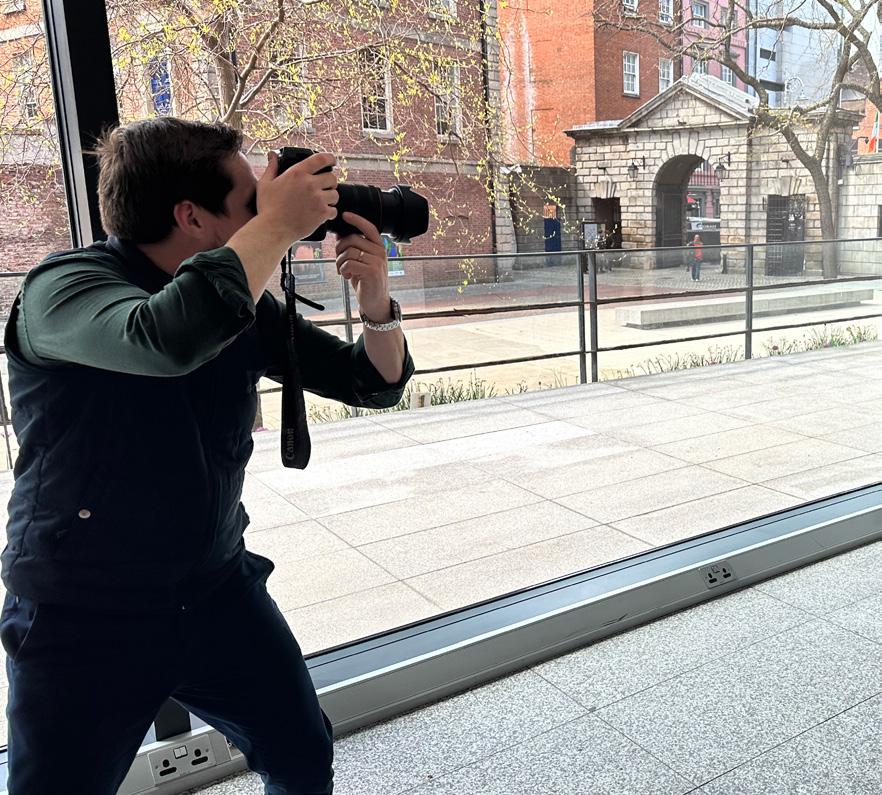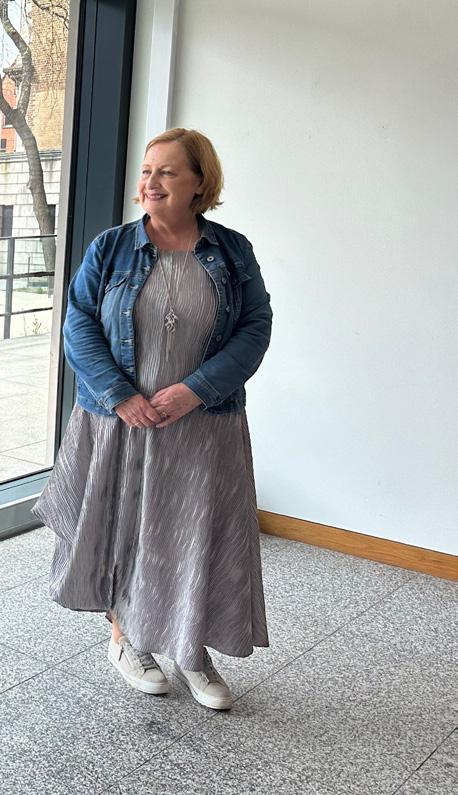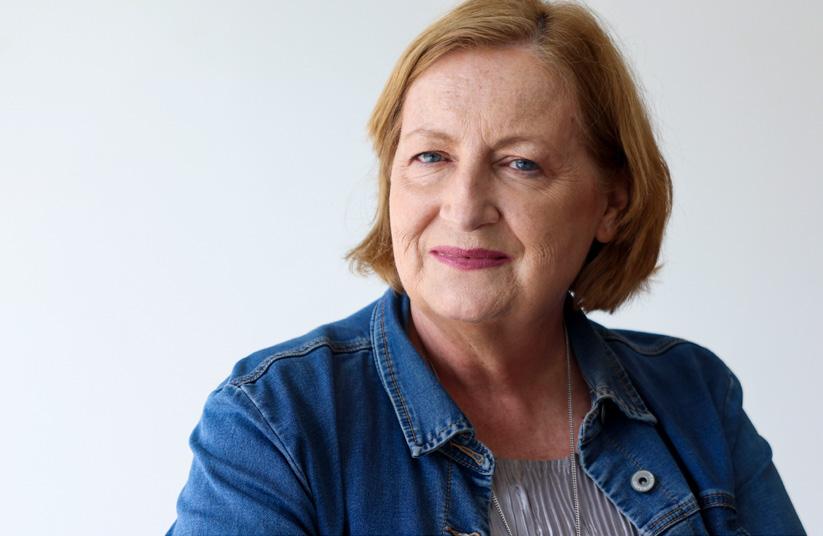
4 minute read
GINNY HANRAHAN
CORU’s retiring Registrar and CEO Ginny Hanrahan on overseeing Ireland’s multi-profession regulator T he Registrar staff
The Council on Licensure, Enforcement and Regulation (CLEAR) recently hosted its seventh international congress in Dublin, Ireland. Among almost two hundred participating regulatory practitioners, one person, a representative from the host country and a deeply respected regulator who was a few weeks away from retirement, stood out.
Ginny Hanrahan was Chair of the committee hosting the event in Dublin. Fifteen years ago, she set up and led CORU, Ireland’s multi-profession health and social care regulator that oversees more than 25,000 licensees from 12 different professions, but is progressing to add an additional 6 professions. To bring colleagues from around the world to her community just weeks before retirement seemed like a fitting salute to her commitment and leadership.
“This entire industry has been fascinating since I’ve started, and with the experience I’ve accumulated over the years, I’m very fortunate to have been in the position that I have been,” says Hanrahan, who previously served on CLEAR’s board of directors and as president.
Starting out
Born in Dublin, Hanrahan contemplated her academic and professional future, until she came across a lo- cal occupational therapist working with an eight-year-old girl.
After receiving her primary education at Holy Faith Convent in Clontarf, Dublin, Hanrahan graduated in 1983 with a Diploma of the College of Occupational Therapists (Dip. COT) from London. She then worked in the field for 17 years, with roles ranging from Home and Community Care Senior Occupational Therapist to Head Occupational Therapist at St. Vincent’s University Hospital, including work in the U.K. and Australia for over seven years.
“I was very involved in the professional body,” Hanrahan reflected. “Later on, I became Chair of the As- sociation of Occupational Therapists of Ireland. However, it became clear to me during my time spent in the field that there was no proper way of dealing with individual professionals who were not practicing in a safe manner.”
“This entire industry has been fascinating since I’ve started, and with the experience I’ve accumulated over the years, I’m very fortunate to have been in the position that I have been.
Charting a new course
Hanrahan recalls the Irish Minister of Health engaging with representatives from 15 health professions in the late 1990’s to become professionally and statutorily regulated. The Health and Social Care Professionals Act 2005 (As
Amended) solidified that idea, three years before Hanrahan finished her term as Head of Clinical Services at Beaumont Hospital Dublin. She applied for the role of Registrar and CEO of CORU in 2008, to establish this new regulator.
“When I got the call, my seven-year-old daughter at the time was sick and I had to console and rub her back as I was reading the confirmation letter,” Hanrahan recalls with a laugh.
Gradually, CORU was built up to what it is today, but Hanrahan notes there were significant challenges. Even in the advent of the 2008 Global Financial Cri- sis, during which time Ireland’s economy was particularly hard hit, the regulator eventually found its footing. Thereafter, the aim of promoting greater patient safety through the statutory registration of health and social care professionals was realized. CORU opened its first register for social workers in 2011 and has progressed with 11 other professions including physiotherapists, medical scientists, dietitians and optometrists.
Hanrahan says that two major developments helped build CORU to what it is today, starting with the implementation of new statutory codes of professional conduct and ethics guidelines. She says that these are incredibly helpful to each profession, so that they know how to navigate conflicts if they arise in their practice. Setting threshold standards for courses to be approved that allow graduates to apply to the register also helps to protect the public. CORU has taken a right touch approach to its work.
Being digitally proficient in their regulatory operations was important, and Hanrahan applauds CORU’s digital transformation. Younger professionals who prefer communication through their phones were kept in mind, Hanrahan said, especially for fitness to practice and professional development oversight.

“There are six generations working in the workforce at the same time,” Hanrahan says of CORU’s staffing. “Digital transformation was important for giving us so much more information and for planning in our work environment, but we have to ensure the messages are meeting the needs of each of the generations.”
Irish regulatory influence
Sustainable regulation is a focal point of CORU’s operations, which Hanrahan has campaigned for since 2012. With the new framework emphasized in their Statement of Strategy 2022-2026, Hanrahan says that it allows CORU to focus on health and social care regulation that is accountable, but also proportionate, adaptable and consistent. Currently CORU has one Council to oversee and coordinate the work of 12 registration boards. It has taken a decade
“Working towards a more engaged, resilient, and compassionate community will always have my interest, and I hope to get involved in other ways with regulation down the line.”
- Hanrahan
of work to get to this point, but she says the multi-profession regulator can serve as a great modern example for the international community.
With an increasing percentage of international professionals working in Ireland, and an increase of diversity in the community in Ireland, Hanrahan says that Diversity, Equity, and Inclusion (DEI) efforts have never been more important. Despite being at an early stage of DEI, CORU’s Stakeholder Manager has been crucial in reaching out to specific communities and gaining their perspectives on regulation.
Hanrahan also believes that regulated professions need to reflect the community they serve and that is not the case, but as a regulator, they must work with educators to support different routes of entry to the profession, to support those from diverse backgrounds to join the professions.

“Darragh [Connolly] has reached out to several communities and asked them how they would like to get involved,” Hanrahan said. “Along with our public ser- vice duty, DEI is crucial for us, and we are beginning to see things moving in the right direction, in encouraging more people from different backgrounds to get involved in the governance of the organisation, especially when we learn from our international colleagues at CLEAR and AHPRA (Australian Health Practitioner Regulation Agency).”
From registrar to retirement
As she transitions to retirement, Hanrahan looks back with fondness at her roles in the Irish and international regulatory community. Even with a shaky start to the organization’s presence, she says that she is leaving CORU in good hands with a strong Council and senior management team. Hanrahan also thinks that the next Registrar will have an extraordinary future to look forward to.
“I think that being very open and clear about identifying what regulation is, and what it isn’t, is important,” Hanrahan said. “We’re all human, and trying to work through a ridiculous caseload won’t help you, or the public you are entrusted to protect.”
“Working towards a more engaged, resilient, and compassionate community will always have my interest, and I hope to get involved in other ways with regulation down the line.”
Happy retirement, Ginny, and thank you for your inspiration and leadership.








